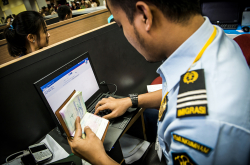We need to maintain close coordination with a wide range of stakeholders and improve data-sharing capabilities to ensure we can follow the trail of criminals as they cross the globe.
Our Integrated Border Management Task Force (IBMTF) is the linchpin in this respect. Drawing on varied expertise, it assists member countries to enhance their own border security by:
- Running operations at air, land, and sea border points;
- Screening people, travel documents, and vehicles against INTERPOL databases during operations;
- Using biometric data;
- Providing access to INTERPOL databases that are not regularly available and focusing enforcement efforts on certain crime areas;
- Delivering training courses related to crime areas often seen at border points;
- Improving worldwide border management policy through direct and indirect partnership with member countries and international organizations.
Training frontline officers
We deliver training courses on basic security measures and crime-specific skills, which are then consolidated through real-time operations designed to put those skills into practice.
Key training topics include:
- Facial recognition;
- Document fraud awareness;
- Use of INTERPOL Mobile Devices (IMD);
- INTERPOL policing capabilities (including INTERPOL notices and databases).
Border security operations
We also run border security operations with the cooperation of international partners and member countries. These target fraudulent documents as well as persons subject to INTERPOL notices and diffusions, and other specific crime areas of importance.
During these operations, we can extend access to INTERPOL’s databases on an ad-hoc basis.
The operations below are a good example of how local law enforcement can leverage INTERPOL tools with impressive results.
Operation STOP: securing borders from transnational crime
The Smuggling Training and Operations Programme (STOP) includes training provided to frontline officers to optimize the use of INTERPOL’s policing capabilities – including its criminal and stolen and lost travel documents databases – to better track the movement of criminals and identify potential victims. Upon completion of the training session, officers are deployed to selected borders where they carry out checks against INTERPOL’s databases. At the heart of Operation STOP is the provision and extension of access for enforcement officers at strategic border points to INTERPOL’s secure global police communications network, I-24/7, with the use of its mobile technology allowing frontline officers to conduct instant checks against INTERPOL’s databases.
Border management is a global issue
We partner with other major international organizations to share data and where appropriate organize joint operations. Some of our key partners are listed below.






